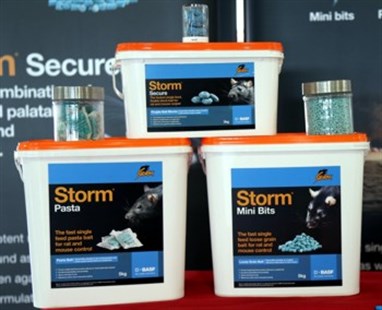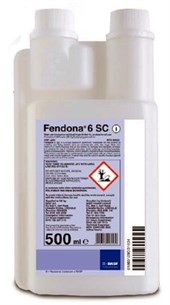Efficient and effective rodent control has always meant choosing the best product for the job in hand. But, now, with greater emphasis on stewardship, product selection also requires thought to be given to minimising any potential environmental impact.
Making the best rodenticide choice
| Following detailed consideration of second-generation anticoagulant rodenticides (SGARs) by the Health & Safety Executive and the development of the UK Stewardship regime by the industry, Storm is no longer confided to indoor use in the UK. Instead it can now be used legally around as well as inside buildings. This allows Storm to make a valuable contribution to general rat as well as indoor mouse control across the country, as has long been the case in other parts of Europe. Storm is highly effective against strains of rats and mice resistant to other SGARs and first-generation actives like warfarin. Its exceptional potency means no practical resistance has been detected nor is it anticipated in either rats or mice. Two new formulations, launched earlier this year, Storm Mini bits and Storm Pasta, have provided added flexibility to the Storm range so should you always choose Storm, whatever the circumstances? |
 BASF’s Gavin Wood |
|
| BASF’s Gavin Wood suggests that the potency of single feed rodenticides like Storm, which makes them so valuable in dealing with rodent populations that are resistant to both first and some second-generation anticoagulant rodenticides, means particular care needs to be taken to safeguard non-target species.
“Our recommendation is that single feed rodenticides should only be employed where they are really needed. Well formulated multi-feed rodenticides such as the Neosorexa range can be as effective as a single feed in many situations.” Clearly if the best available multi-feed products have failed to control a rodent population around a building then switching to Storm Secure or Storm Pasta is justified. Storm should also be the product of choice when rats and mice are known to be resistant to other second-generation anticoagulant rodenticides (SGARs). The third situation where Storm should be used is indoors to complement external multi-feed bating as part of an anti-resistance strategy. Gavin stresses that pulse baiting should be used for all single feed products. Strictly limited amounts of Storm put our weekly – with an extra dose in the middle of the first week for high infestation – gives reliable control and uses 75% less bait and requires 25% fewer visits which together significantly reduces treatment costs. |
||
Storm now comes in three formulations: |
||
|
 |
|
Fendona, the original alpha-cypermethrin product,
|
 |

